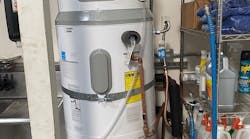Latest from Hydronics
Sponsored
Many communities across the United States embrace the idea of fighting climate change and advancing sustainability initiatives, but Riverside, California does more than talk a good game. So do many of its businesses.
Phenix Technology is an industry-recognized manufacturer of high-quality safety products used by firefighters and first responders all around the world. The company prides itself on its products, but also its lean manufacturing and its core values. “We believe that leaving world a better place than we found it is the ultimate goal and the core value that drives everything we do,’’ said Angel Sanchez, Phenix’s Chief Executive Officer.
No detail is too big or too small in the company’s environmental commitment and is one of the primary reasons the company selected an American Standard Water Heaters Hybrid Heat Pump for its 14,000 square foot office in Riverside. The 80-gallon heater is ENERGY STAR certified and uses up to 55 percent less energy than other units that meet the minimum federal standard.
Taking Advantage
Minimizing the company’s carbon footprint is one of the primary objectives for Sanchez, and he saw the Hybrid Heat Pump as a way to help save energy in the building.
“We didn’t have much of a problem with our existing system, but we thought this was a good opportunity for us to make a change that we felt would reduce our energy consumption,’’ Sanchez said. “It’s all part of our lean manufacturing process and contributing to our community’s goals.”
The Hybrid Heat Pump is available in 50-, 65- and 80-gallon capacities. The product includes a 10-year warranty, and a wide range of other benefits.
“We took out a 50-gallon tank and replaced it with an 80-gallon tank, so the recovery is a little bit slower,’’ said Josh Provin of General Installation. “While it is slower recovery, you gain efficiency. There are some tradeoffs. But as long as you have the space to install a bigger unit, I don’t see any reason why you wouldn’t go with the bigger unit. The efficiency is that much better.”
The units include built-in leak detection, five operating modes, and an integrated Wi-Fi and Comfort Link App that allows people to people to remotely monitor and control the water heater.
There is also a feature called I-Memory, which is a self-learning habit algorithm that will ensure the customer has hot water when they need it and save energy when they don’t.
“The ability to connect to Wi-Fi and monitor the system is a really nice feature for this project,’’ Provin said. “And the automatic leak detection protects them in terms of property damage. We’ve never seen them in residential water heaters. It’s usually an after-market product that has to be added on. There are a lot of features that are very cool.”
Wave of the Future
Phenix’s installation of the Hybrid Heat Pump is the start of a trend that is going to gain steam over the next few years.
In July, the Department of Energy proposed a new efficiency standard for home water heaters that requires 90 percent efficiency for tankless and 70 percent efficiency for tank gas-fired water heaters.
The proposal would take effect in 2029, and under the proposal the most commonly used electric water heaters would be required to use heat pump technology in place of electrical resistance. Gas-fired instantaneous water heaters would be required to use condensing technology.
Heat pump water heaters pull heat from surrounding air and transfers it at a higher temperature to heat water in a storage tank.
According to the Energy Department, the proposal would save consumers about $11.4 billion in energy and water costs annually. It would also reduce 501 million tons of carbon dioxide emissions over the rule’s 30-year lifetime.
“Today’s actions—together with our industry partners and stakeholders—improve outdated efficiency standards for common household appliances, which is essential to slashing utility bills for American families and cutting harmful carbon emissions,” Energy Secretary Jennifer Granholm said when the proposal was introduced.
Community Commitment
Phenix is a proud member of the business community in Riverside, which was named the state’s first “Emerald City” in recognition for sustainable green initiatives and commitment to help the state achieve multiple state environmental policies.
Riverside’s commitment to sustainability started much earlier than most communities. It was designated an Emerald City in 2009 by the California Department of Conservation and was one of two cities in the pilot project that gauges sustainable land uses and development principles; energy conservation and efficiency; water conservation and quality; environmental health of citizens; and waste reduction and recycling.
“This didn’t happen by accident,’’ Riverside Mayor Ronald Loveridge said at the time. “Our Green Action Plan was not created to sit on a shelf for show. It’s a real-world guideline for our environmental future.”
The community’s focus aligns with Phenix, which offers weekly tours that showcase the company’s products but also its commitment sustainable business practices. The Hybrid Heat Pump is prominently displayed as visitors tour the business.
“We’re happy to talk about it as part of our business culture and how it is part of company’s overall objectives,’’ Sanchez said. “We have different aspects of continuous improvement and respect for people. A lot of the focus, especially in this area, is recognition that water is a precious resource and elimination of waste is important in how we conduct our business.”
Growing Trend
Installation of the American Standard Hybrid Heat Pump at Phenix is illustrative of a trend that figures to evolve rapidly over the next decade.
According to statistics from Precedence Research, the global heat pump market reached $86.4 billion in 2022. The market size is expected to surge to $209.2 billion by 2032, with a compound annual growth rate of 9.3 percent. North America is one of the regions expected to garner a large share of the increased revenue. Tax credits of up to $2,000 from the Inflation Reduction Act are also helping spur interest in heat pump technology.
“Heat pump water heaters are going to become more and more popular,’’ Provin said. “Especially in areas such as southern California, where you have temperatures in the 70-80 degree range, pulling heat out of the air to heat water makes a lot of sense. It’s a great product for the future.”
Thomas Renner writers on building, construction and other trade industry topics for publications throughout the United States.



